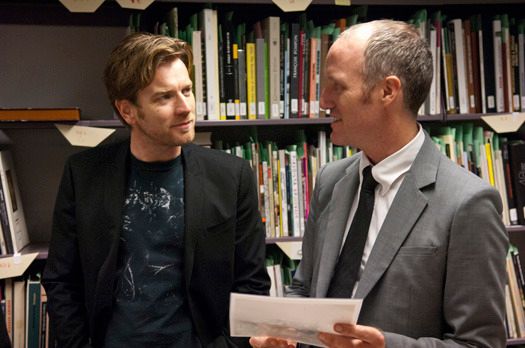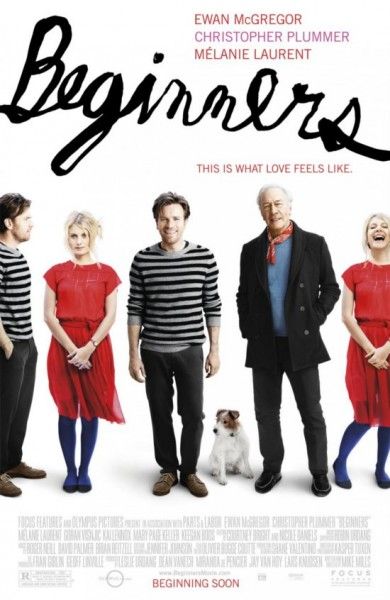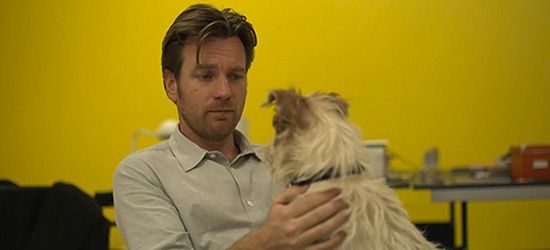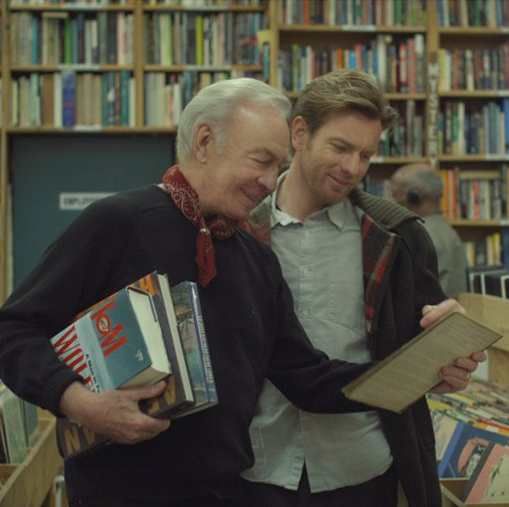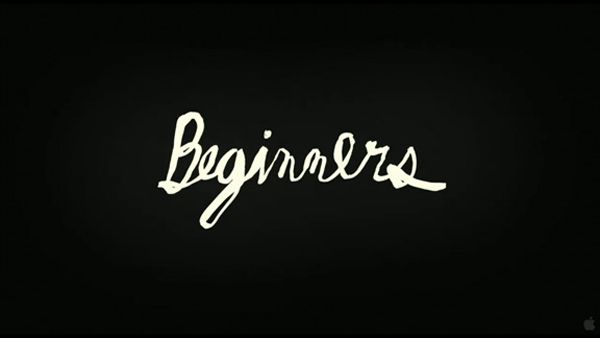After the death of his father, writer/director Mike Mills decided to reflect on his grief and write a script. Thinking about his father, who came out of the closet at the age of 75, after having been married to his mother for 45 years, he realized that the hunger to completely change your life and live as your truest self was confusing, painful, funny and deeply inspiring. When his father passed away five years later to cancer, he did so as open and honest as he’d ever been. From that, Beginners was born out of the belief that something so personal could become universal for other people.
At the film’s press day, Mike Mills talked to Collider in this exclusive interview about opening himself up to telling such a personal story, how his own father’s honesty changed how he wanted to live his own life, why Ewan McGregor was the perfect actor to take on the role that was essentially a version of himself, finding the perfect canine companion for the film, and that he thinks his father would have been touched by this. Check out what he had to say after the jump:
Before getting to the interview, here's the synopsis for Beginners:
In Beginners, Oliver (Ewan McGregor) meets the irreverent and unpredictable Anna (Melanie Laurent) only months after his father Hal (Christopher Plummer) has passed away. This new love floods Oliver with memories of his father who -- following 45 years of marriage -- came out of the closet at age 75 to live a full, energized, and wonderfully tumultuous gay life. The upheavals of Hal’s new honesty, by turns both funny and moving, brought father and son closer than they’d ever been able to be. Now Oliver endeavors to love Anna with all the bravery, humor, and hope that his father taught him.
_
Question: How did this whole thing start for you, as far as opening yourself up to telling something so personal?
MIKE MILLS: For me, I love so many other artists that do this. I love being the audience when people are doing this. The radio show This American Life was a huge thing for me, with how honest, open and revealing people are on that. Leonard Cohen was really writing about his life, in many ways. I like Woody Allen when he was more real, from Annie Hall to Manhattan. That’s really him trying to figure out relationships. Fellini’s 8 ½ is a real personal story, or [Allen] Ginsberg’s Howl. I’ve always loved this terrain, or people who do this. In lots of ways, their bravery before me made it easy for me to say, “I want to be like that.”
I love the autobiographical quality of that. It makes it more communicable to me. It doesn’t make it smaller, it makes it easier to grab onto and relate to, and it makes it more true-feeling. There’s another amazing film, called Lovefilm, by István Szabó. It’s a Hungarian film from 1970, and it’s all about memory. That was a big influence on me. You just know it’s real. You can just tell this stuff happened to this person, but it’s a story and you can also totally enjoy it as a story. So, I had a lot of models. And then, it was when my dad was dying that I was like, “There’s something here. The story of my parents’ marriage is so weird, wild and confusing, and there’s all the bravery that my dad is expressing right now. He’s willing to risk so much and make himself so vulnerable.” I knew I wanted to talk about that, somehow.
Did you find yourself learning more about your parents, once they were gone and you were looking at how to tell this story?
MILLS: I don’t feel like there were whole things I didn’t know, but there were things I held onto more tightly and studied more, like my parents’ humor. My parents were funny, but I didn’t quite get how funny. I wouldn’t have described them as funny, when they were alive. But, writing from their perspective, I so often realized, “Oh, they would have made a joke right here, or some subversive slip of the whole situation.” They did that a lot. My dad was very poised and polite. He was born in 1924, kind of shy and very aesthetic. He wore a suit and was very proper. In creating the Andy (Goran Visnjic) character, I had seen my real dad gravitate towards all these guys – not just romantically, but his gay friends – who were way wilder, way more messy, way less aesthetic, way juicier, more emotional, less "boundaried" and kind of messy. It was really beautiful and heartbreaking to realize, “Wow, that’s what he wants. He wants to be more like that. Consciously and unconsciously, he’s attracted to these guys.” I knew that, but I knew it better after writing about it.
What’s it been like to show this film to so many audiences, at screenings and film festivals, and get the positive reaction that you’ve been getting?
MILLS: It’s really weird. When all different kinds of people – old people, young people, gay people, straight people – like it, or cry, or have a real emotional experience, I feel crazily lucky. When a film works, the director had a lot to do with that, but the director also didn’t have a lot to do with that. There are so many moving parts. It’s really about being open to how the river is flowing and trying to get on the river. In this case, with so much of it, I really feel like I just transferred my dad’s energy. I just conveyed my dad’s energy, or his willingness to risk. But, it’s been crazy. It makes me nervous. Even the positivity makes me nervous, somehow. When I started writing this film, I was in that grief place where I was like, “Fuck it, I just have to do this. Who knows if people will like this. A lot of people will think this is just a narcissistic, self-pitying memoir, which makes me embarrassed to think, but what else am I going to do in my life? I need to do this.” So, when I see it working or communicating with people, it does feel sort of like an out-of-body experience.
Did your father’s honesty about his sexuality change who you were and how you decided you wanted to live your own life?
MILLS: Yeah, for sure. It was like one new, big model. I still have all my old models. I still have my old dad in my head a lot. I had my first 33 years with my straight dad, but my new, gay dad taught me a lot. He just got so much more in my business, and really would challenge me about my relationships and what I was doing right and wrong. He was so much less polite, in the best way. He just was so much more engaging, so I had way more of a dad than I had had previously. He was much more there. Not just the romantic love, but the friendship love that I saw him go through was harder and messier, and it taught me a lot about how to do that and that love requires that. Life has a lot of mess. I grew up in a family that was aesthetic and looked right, but it had all these holes and all of this loneliness inside it, behind the look. So, I went from a family that looked right but felt lonely, to a family that maybe looked wrong to many people but felt way more full.
This film was born out of grief, but is ultimately a very hopeful and sweet story. Was it important for you to convey that?
MILLS: Well, to me, that is grief. My experience, with both my parents, is that grief has a lot of down, sad things, but I was also really emotionally raw, in the first year after each of them past. Flowers smelled more intensely, my relationships were hotter, and I was more willing to risk. I was going for it a lot more. I was “unsober” and I wasn’t playing by my rules.
There is a magical quality to that. There is a drunkenness to grief, which is good. I feel like the humor in the film, the whimsicalness, the hopefulness and the positivity were really part of my real experience. It wasn’t like my dad was mowed over by a car, by surprise when he was 50. That would be such a different experience and maybe a different grief. I don’t know. The first thing I did when I started writing this was that I started studying a lot of rag piano, which comes from New Orleans, and all those funeral marches. They’re these really jubilant songs with people screaming and hollering, and that felt really right to me. That felt not forced, at all. Yeah, there’s great sadness and life doesn’t work out like you would want, on a lot of levels, but there’s no need to feel all alone. This happens to everybody, so there’s no self-pity. This is the ride that humans are on, and all of it is essential for our natural part of it.
What was it about Ewan McGregor that made you want him for this role?
MILLS: Before I met Ewan, I sensed that he was very genuine. In a lot of his performances, there’s something very authentic and genuine. It’s not just good acting or really naturalistic acting, but he gets it into his bloodstream. With things like Velvet Goldmine, he goes for it. Not every actor would have wanted to express all the emotions of that character. He really got vulnerable on screen, and that’s what I knew I needed. And then, he has this boyishness to him that I thought would be good for the humor. But, it’s a guess. You don’t really know. You don’t get to audition those guys. I didn’t know how lucky I was until after I met him.
How challenging was it to find his female counterpart for the film?
MILLS: It was hard to find the character I wrote. I really wanted a strong woman, who was smart and kind of wild, but not a crazy actress. I felt like Melanie [Laurent] did that. She’s really in touch with her feelings and comes from a very real place. Yeah, she can be really unpredictable and super-intuitive, but the reality of her emotions was there and I guess I sensed that in her. Inglorious Bastards wasn’t out. She hadn’t been in any other American films, so I just watched her in all these YouTube things and interviews, and she had that, to me. I was just picking up her energy.
Where did this love story come from?
MILLS: It’s very real, but it’s not me and my wife. It’s not a specific thing, but I know about all of his emotional problems. Also, I felt like I was doing a portrait of so many friends of mine, both men and women, both gay and straight. I feel like it’s people born in the ‘60s and younger. I have so many friends who have all had these issues, problems and conversations, so I was talking about that. But, I have definitely been there. Their story was really free. They were having such a good time together. That was wild, those two. It was two different films, in lots of ways. Christopher is just much more planned of an actor, and he set that tone. And then, Melanie [Laurent] and Ewan were just so intuitive and trusting of their instincts, and I like that. I push it. I said, “Just do whatever you want. Let it be real.” It was fun.
Did you approach Arthur as a character and not just a dog?
MILLS: He is a character. He’s a full being.
How challenging was it to cast the role of Arthur?
MILLS: That was fun! I’m a dog lover and a dog nut. It was like the real casting couch experience for me. I literally was on my couch at my house, and I had eight or nine dogs come, over a couple of days. Cosmo is really special. He’s really gregarious. He’d jump up in your lap and look you in the eye. He’s a lot like Ewan. They’re very charming, warm people that you gravitate towards and are real easy-going. You lean into his spirit. He comes with Mathilde [de Cagny], his trainer who he lives with, and she’s so unlike all the other trainers. She’s so much less regimented, really fun and really organic. She’s French. She was at the audition at my house and my assistant was there and I was like, “Has she done anything? She’s really interesting, but is she a real trainer?” And, my assistant was like, “She did Frasier for 11 years.”
Was it difficult to figure out how many times you would use subtitles for the dog’s thoughts?
MILLS: There were maybe a few more times in the script than what’s in the movie, but it’s almost pretty much what I wrote. To me, all animals have full personhood. They’re equals. They’re not less than, they’re just different. Dogs have 250 million smell sensitive cells in their nose, and we have five million. They can smell where a female dog is in her menstrual cycle, how tall the dog is, what emotion the dog was having when they peed. We can’t do that. So, I tried to just really be sensitive to the dog as other and not as less than. Me and Ewan had a really amazing rehearsal day where we just hung out with Cosmo and sat on his bed, and just talked to him, knowing that he doesn’t understand English, but not at all talking cute or talking down. It took a little while because he’s so cute and we’re just used to talking to animals like that, but it was key to me to have them be equals of utterly different paradigms. I remember saying, “Just think of him as a highly intelligent alien friend that doesn’t speak English and has a different mind than ours.” Cosmo is amazing.
How did it feel to get Christopher Plummer for this role?
MILLS: I kept waiting for him to go, “Ah, no.” You just get used to so much rejection that, even when I met him and it seemed to go great, and I got the call saying, “Yeah, Christopher really enjoyed you and it seems like it will work out,” I was like, “Oh, it’s not going to work out. Something is going to go wrong.” It was a trip. With Ewan, too, it was a real trip. My last film has a lot of big people in it, but it wasn’t a big success, so it’s gotten harder for me. So, it was really quite miraculous. And, Christopher can be very scary. He’s worked with John Huston, [Elia] Kazan and Michael Mann. As a director, he’s slept with all the best. But, one thing that really helped me be brave and just stay inside my body was that I had my dad to deal with. I had his ghost, or just his memory and his story, and that was more important than any of my nervousness about Christopher, or being a director, or any of that stuff.
What was the rehearsal process like for this?
MILLS: I do one scene, at the end of the day, and we just do it once, especially with actors like Christopher and Ewan. I don’t want them to get used to it or develop a set idea of how the scene is going to be. So, we had lunch and then I said, “You’re going to go to Barney’s.” I do all of these improvisational experiential things that are wild and nutty, but it gets a good vibe going. So I said, “Ewan, you take Christopher to Barney’s, and Christopher, you’re gay now and you want to make yourself attractive to younger men.” I made a mistake and said, “Ewan, here’s 300 bucks, get a scarf or something small.” They were alone. That was the key thing. They were having their own time together.
On the way over there, Ewan had on skinny jeans, and Christopher was like, “What are those? They’re awfully skinny and they’re awfully tight.” And, Ewan was like, “Well, Christopher, they’re called skinny jeans.” So, they entered Barney’s, and Ewan headed over to the scarf department and Christopher was off in the jean department, and Ewan can’t wrangle him. I only gave them 45 minutes, but Christopher ended up staying at the jean department for over an hour, trying on every kind of pair, and Ewan was getting pairs and bringing them to the dressing room. He spent over $1,000 that Ewan had to pay for, but he wears all the jeans in the movie. Those kinds of messes end up being really great bonding experiences. I was trying to create a situation that would be very much like the experiences that the characters have in the movie. Hal is always going off shopping or living his life, and Oliver is often in tow, trying to help or keep up or make sure he’s okay.
What do you think your dad would have thought of this film?
MILLS: My dad was a very complicated art historian and very bossy man, in lots of ways, as I am. I can just imagine him being like, “Michael, why not more of this? Why not less of this?” I could see that. But, I also feel like I couldn’t have made this film, if I didn’t feel like I was making it out of love and real curiosity about my dad and real admiration for his coming out. I think he would have felt that. I think he would have been touched by how much time I spent thinking about him. I think he would have loved a film with an older gay character, whether it was based on him or not. He would have really loved that. I’m sure he would have his qualms and his list of things, but I couldn’t have made it, if I felt like I was upsetting him.

